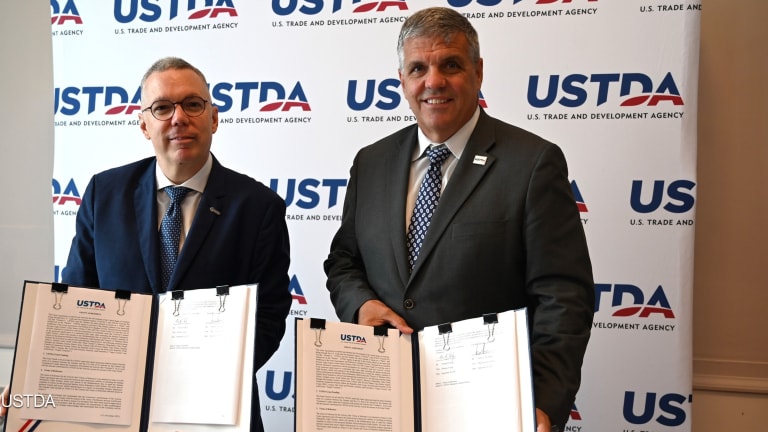
This guest column was co-authored with Maggie Nelsen, an intern with the CSIS Project on Prosperity and Development.
Late last month, Li Yong from the People’s Republic of China was elected the new director general of the United Nations Industrial Development Organization for a four-year term.
Normally, such an event would make little splash in Washington, but the circumstances of this election should be met with interest by both the U.S. government and the development community in general.
The election of Li signifies China’s ambition to broaden its involvement in global development through established international platforms. The development community in the U.S. and abroad should consider closer engagement with China both a reality and a necessity.
With this election, Li has become the first Chinese government official to be elected executive of any major multilateral organization. And out of seven candidates, he emerged as the clear winner, receiving 37 of 53 total votes from member states.
While individuals from China have held other senior positions in major agencies before, Li’s personal and professional background sets him apart from the others, all of whom have had significant ties outside mainland China.
As director general, Li now heads an organization that not only delivers direct services and funding, but wields substantial power in shaping global economic development priorities. UNIDO seeks nontraditional, often private sector-led solutions to common development challenges and is often seen as the development agency for middle-income countries.
The leadership and direction of UNIDO are therefore of relevance to private development companies, NGOs, and bilateral donor agencies alike.
Because the United States has not been a member since 1996, the American development community generally underutilizes UNIDO’s capabilities; now, they would be wise to revisit UNIDO as a development partner.
Beginning in the 1990s, the United States, Canada, Australia, and the United Kingdom have all withdrawn from UNIDO, with France set to follow suit. However, these departures may actually open up opportunity for other development players to partner with UNIDO.
The absence of the U.S. and those other states allows Li to run an agency that is less geopolitically complicated than others. Moreover, the agency’s current membership now better reflects the very constituency it seeks to assist—with the support of remaining wealthy donor countries, such as Germany, South Korea, Italy, Spain, and Japan.
UNIDO’s model actually aligns closely with China’s apolitical approach to development, including a focus on investment, trade, and technology transfers.
In the lead-up to the election, China promoted Li in a systematic manner reminiscent of full-blown political campaigns. Li’s official public relations video proposed a forward-looking strategy for the agency, involving expanding partnerships, aligning the UNIDO agenda with post-2015 Millennium Development Goals, strengthening management, and motivating staff. Li ran a more organized campaign than did any of his competitors, benefiting from extensive support from the Chinese government.
Li succeeds outgoing Director General Kandeh Yumkella, whose appointment as U.N. special chairman on energy by Secretary General Ban Ki Moon, speaks to UNIDO’s profile within the U.N. system. In a keynote address at CSIS in 2011, Yumkella articulated UNIDO’s diverse portfolio of projects, including poverty reduction, energy efficiency, and public-private partnerships.
UNIDO’s relevance to international development should not be underestimated; China’s fervent and strategic support of its candidate for director general speaks to its belief in UNIDO’s potential. That support may translate into China injecting sizeable funds into UNIDO.
If Li is successful in invigorating UNIDO as an effective and financially sustainable agency, then the international community might adjust its perspective on both the significance of UNIDO and Chinese global leadership.
Li’s election might be perceived as part of China’s rival offerings of alternatives to Western and U.S. global standards of economic trade, development, and multilateral partnership. In fact, it should be seen as an opportunity to further integrate China into the global system.
That said, as China’s presence in international development expands, the U.S. and other countries will want to continue ensuring that China abides by global standards of free trade and partnership.
The only medium-term worry is that China may begin to set its own global standards, instead of following pre-established international standards. To counter this possibility, the development community can work with UNIDO to promote universal standards of free trade and partnership.
Li Yong’s election as director-general of UNIDO is an important step for Chinese global leadership moving forward, and American development actors should keep pace.
Explore related content:
Rhetoric and reality: Obama’s vision for aid and trade with Africa
UNIDO’s Gerardo Patacconi on inclusive growth: Local sourcing is sometimes the problem
Join Devex, the largest online community for international development, to network with peers, discover talent and forge new partnerships - it’s free! Then sign up for the Devex Impact newsletter to receive cutting-edge news and analysis every month on the intersection of business and development.








